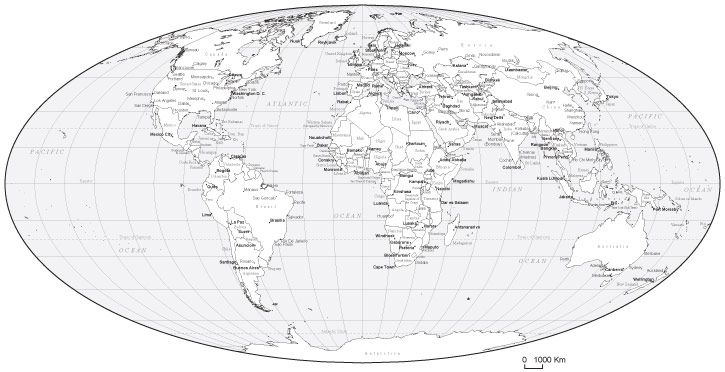We all belong to a country. Every country has meaning. It has reasons to get name. Countries are typically named for (or derive names from) ethnic groups, famous individuals, geographical locations, and geological features. We bring A to Z country’s name meaning and origin. Check it out!

Albania
Just like Afghanistan, Albania is a mountainous country. It took its name from the Albanoi tribe, which in turn took it from an Indo-European word alb, meaning ‘mountain’.
Afghanistan
While some sources claim that Afghan may come from the Sanskrit Avagana, itself perhaps derived from the Sumerian name of the Badakshan region, Ab-bar-Gan, ‘Mountainous Country’, according to a Persian translation, Afghan means ‘wailing’ or ‘moaning’.
Algeria
Algeria is the Anglicization of the Arabic name Al Jazā᾽ir, ‘the islands’.
Andorra
The name Andorra comes from a local Navarrese word, andurrial, meaning ‘shrub-covered land’. It has also been suggested that the country took its name from Arabic al-Gandura, ‘the wanton woman’, a legacy from the Moors.
Angola
The Portuguese called the Angola area after the first word of the title of the ruler of the Mbundu people in Ndongo, Ngola a kiluanje.
Antigua and Barbuda
Christopher Columbus named Antigua after the Church of Santa Maria de la Antigua, ‘St Mary the Ancient’, in Seville, Spain. The origin of the name Barbuda is not clear, but it has been suggested that it is derived from the Spanish barbados, ‘bearded’.
Argentina
The name Argentina is said to have been coined by Spanish explorers who, when they first came to the region, noticed the silver ornaments worn by the natives. Thus the word is from the Spanish argentine, ‘silvery’, and means ‘(Land of) the Silver (River)’.
Armenia
The Armenians call themselves ‘the Hayk’ after Noah’s great-great-grandson from whom the Armenians claim descent. The Armenian name thus means the ‘Land of Hayk’. Armenia, however, may be a modification of Aramaean, a tribe which lived in northern Syria.
Australia
Imagining the existence of a land located in the Southern hemisphere, the Greeks came up with the name Terra Australis Incognita, meaning ‘Unknown Southern Land’.
Austria
The present name is derived from the fact that the region became a military district on the eastern border called Ostmark, ‘East Mark’, of Emperor Charlemagne’s Frankish kingdom as a buffer against the Avars; it was also referred to as the Avarian Mark.
Azerbaijan
Azerbaijan may take its name from one of Alexander III the Great’s Persian generals, Atropates, who in turn took his name from the Greek atropatan, ‘protected by fire’.
Bahamas
It is not entirely clear where the Bahamas got their name, but it is said to mean ‘Shallow Sea’ from the Spanish baja mar. It has also been speculated that it is derived from a much older Lucayan word.
Bahrain
Bahrain means ‘Two Seas’, from baḥrayn, the plural of baḥr. It is a reference to the fact that the kingdom has ‘seas’ to the east and west.
Bangladesh
Bangladesh means ‘Land of the Bengalis’, from deś, ‘land’ or ‘country’. The Bengalis take their name from Banga, the chief of the Dravidian-speaking Bang tribe.
Barbados
Barbados means meaning ‘bearded’ or ‘the bearded ones’.
Barbados is a Spanish word meaning ‘bearded’ or ‘the bearded ones’. It has been speculated that Barbuda got its name from the same root.
Belarus
The present name Belarus is a shortening of Belaya Rus, meaning ‘White Ruthenia’, but was rendered as ‘White Russia’ in 1795.
Belgium
The country is named after the Belgae, a confederation of tribes that lived between the Rivers Rhine and Loire in Roman times.
Belize
Named after the Belize River. The actual name Belize may be a Spanish mispronunciation of the name Wallace, a Scottish adventurer who is said to have established a settlement at the mouth of the river.
Benin
The name may be derived from the Bini, Benin’s original inhabitants. Alternatively, Benin may come from the Yoruba Ile–ibinu, ‘Land of Argument’, a possible reference to a time when the tribes were at war.
Bhutan
Named Dzongkha in the language of Bhutan, from Druk-Yul, ‘Land of the Thunder Dragon’, often also translated as ‘Land of the Peaceful Dragon’. Bhutan itself is perhaps from Sanskrit Bhot-ant, ‘End of Tibet’, or Bhu-uttan, ‘High End’, or Bhots-than, ‘Land of the Bhutia’ (a Himalayan people originally from Tibet).
Bolivia
Bolivia takes its name from Simón Bolívar, a national hero who led the revolutions against Spanish rule in South America.
Bosnia and Herzegovina
Bosnia is named after the River Bosna, while the name Herzegovina comes from the Old Serbian Herceg, ‘duke’, ov, to make the genitive case of herceg in order to indicate possession, and ina, ‘property’. It thus means ‘Property of a Duke’, or simply ‘Duchy’.
Botswana
Named after the indigenous people, the Tswana or baTswana. Their name apparently means ‘those who went away’ or ‘the separators’.
Brazil
Brazil takes its name from the pau-brasil tree from which a valuable red dye is extracted.
Brunei
The name Brunei is perhaps derived from the Sanskrit bhūmi, ‘land’.
Bulgaria
Possibly from the Turkic bulga, ‘mixed’, Bulgaria is named after the Bulgars, a mix of Turkic and Slav tribes.
Burkina Faso
Burkina Faso translates to ‘Land of Honest Men’, from Mandekan Burkina, ‘honest’ or ‘upright’, and faso, ‘fatherland’.
Burundi
The name comes either from Kirundi, a Bantu language spoken in Burundi, with Bu, a prefix indicating the country, or from the name of the Rundi people.
Cambodia
Cambodia is the Latinized form of the Sanskrit Kambuja, which in turn is derived from Sanskrit nagara, ‘city’.
Cameroon
Cameroon is the Anglicized form of the Portuguese Camarões. The area was named Rio dos Camarões, ‘River of Prawns’, by Portuguese explorers.
Canada
Canada’s is perhaps derived from Huron-Iroquois kanata, meaning ‘village’ or ‘settlement’. Canada’s name is perhaps derived from the Huron-Iroquois word kanata, meaning ‘village’ or ‘settlement’.
Cape Verde
Named by the Portuguese, Cape Verde translates to ‘Green Cape’.
Central African Republic
The country’s name is a reference to the fact that it lies at the centre of Africa. Its previous name, Oubangui-Chari, comes from the Bantu ou, ‘land’, and bangi, ‘rapid’, and from a reference to the river Chari.
Chad
The name is taken from the Lake Chad, which in turn takes its name from the Bornu tsade, ‘lake’, itself from the Arabic tŝād, ‘large lake’.
Chile
It is not known how the country got its name, but it may be derived from an Araucanian word for a type of bird. Another theory suggests that it may be a local word meaning ‘where the land ends’.
China
China takes its English name from the state of Quin, a western Chinese kingdom during the Zhou dynasty.
Colombia
Previously called New Granada after the Granada in Spain, Colombia’s present name was adapted in 1863 in honour of Christopher Columbus.
Comoros
The name of Comoros is adapted from the Arabic qamr, ‘moon’.
Congo
The Congo got its name from the river Kongo, which is named after the Kongo people who founded the Kongo kingdom. Kong or kongo is a Bantu word for ‘mountains’.
Costa Rica
Costa Rica means ‘rich coast’. The name was chosen by Christopher Columbus, who may have believed that gold would be found there.
Cote d’Ivoire
The Cote d’Ivoire, or Ivory Coast in English, is so called because the French and Portuguese confined themselves to the coast to trade in ivory in pre-colonial times.
Croatia
Named after the Croats. Their name is either derived from the Persian choroatos, ‘nomads’, from the Caucasus, or from the Serbo-Croat hrbat, ‘mountain ridge’, a reference to the mountains along the Adriatic coast.
Cuba
Cuba, which is located roughly in the centre of the Caribbean, may have adapted its name from the Taino word Cubanacan, ‘centre place’.
Cyprus
It is believed that the island’s abundant deposits of copper led to the Greeks naming it Kypros. According to another theory, however, the name Cyprus may be taken from the son or daughter of Kinyras, mentioned by Homer as King of Cyprus.
Czech Republic
Named after the Češi, a Slav tribe which came from the east. The name may derive from the Slavonic četa, ‘company’ or ‘group of warriors’, or from Čech, a legendary Slav chieftain. In 2016, the country announced its plan to have its English name Czech Republic shortened to Czechia.
Denmark
Denmark took its name from the Danes, possibly meaning ‘warrior’. Another theory suggests that it is derived from Old High German tanar, ‘sandbank’, a reference to the number of islands belonging to the country.
Djibouti
The name probably comes from an Afar word, gabouri, ‘plate’. It may refer to the fact that the city is on the coastal plain and surrounded by flat desert.
Dominica
Discovered by Christopher Columbus and named after the ‘Lord’s Day’, Dies Dominica, or ‘Sunday’, in Latin.
Dominican Republic
The Dominican Republic was previously called Santo Domingo, ‘Holy Sunday’, a reference to the fact that it was discovered on a Sunday.
East Timor
Timor comes from the Malay timur, ‘east’. East Timor, also known as ‘Timor-Leste’, takes Timor from the Malay timur, ‘east’ – thus East Timor means ‘East East’.
Ecuador
The name means ‘Equator’ in Spanish, a reference to the equator running through the northern part of the country.
Egypt
The ancient Greek and Roman names Aiguptos and Ægyptus are derived from the Egyptian hūt-kā-ptah, ‘Temple of the Soul of Ptah’, from hūt, ‘temple’, and kā, ‘soul’, and the god Ptah. The Latin name Ægyptus is said to mean ‘The Land below the Aegean Sea’, from aigaiou hyptios.
El Salvador
Meaning ‘The Saviour’, the country takes its name from a Spanish fort located on the present site of the capital San Salvador.
Eritrea
Eritrea was named by the Italians, from the Italianized version of the Latin Mare Erythraeum, ‘Red Sea’, from the ancient Greek erythros, ‘red’.
Estonia
The country is named after its inhabitants, the Eesti. It is unclear where the word eesti comes from.
Ethiopia
The Greeks named the country Aithiops, ‘(Land of) Burnt Faces’, from aithō, ‘I burn’, and opsis, ‘appearance’.
Fiji
The meaning of Fiji is not known, but it takes its name from its largest island, Viti Levu, meaning ‘Great Fiji’.
Finland
Finland is perhaps derived from the Germanic finna, ‘fish scale’. The English name, meaning ‘Land of the Finns’, is perhaps derived from the Germanic (or Teutonic Scandinavian) finna, ‘fish scale’. It may be a reference to the type of clothing worn by the primitive Finnish tribes.
France
The country takes its name from a coalition of Germanic tribes, the Franks, who conquered Gaul (the ancient region of Europe, corresponding to modern France, Belgium, the south Netherlands, SW Germany, and northern Italy) after the fall of the Roman Empire. The name Frank either comes from the Old German word franka, meaning ‘fierce’ or ‘brave’, or from a personal name.
Gabon
The country adopted the name from the Portuguese, who came up with the name Gabão, ‘hooded cloak’, for the Gabon Estuary, so called because of its shape.
Gambia
The country takes its name from the Gambia River, itself named by the Portuguese after the local name, Ba-Dimma, ‘The River’. It has also been suggested that the name comes from the Portuguese câmbio, ‘exchange’, in reference to the trade carried out along the river.
Georgia
The name is derived from the Arabic and Persian words kurj and gurj, both meaning ‘country’ or ‘land’.
Germany
The English name for Germany comes from the Roman Germania. Its origin is unclear, but it has been suggested that it is derived from the Germanic gari, ‘lance’, and man, ‘people’. Another theory connects it with the Celtic gair, meaning ‘neighbour’.
Ghana
Ghana perhaps means ‘king’ or ‘sovereign’ and may be derived from the title assumed by the tribal chieftain of the old Ghanaian empire that was located to the north of modern Ghana.
Greece
In English, named after the Graeci people, who may have taken their name from Graecus, a personal name. The Romans used the name Graecia for the country, from which the modern name is derived.
Grenada
Named Grenada by Spanish sailors because the landscape reminded them of the region around Granada in Spain.
Guatemala
The origin of the name Guatemala is not entirely clear, but it has been suggested that it comes from an Aztec word, Quauhtemallan, meaning ‘Land of Many Trees’ or ‘Land of the Eagle’. It is also possible that the country takes its name from the word Guhatezmalha, ‘Mountain of Gushing Water’, after the volcano of Agua.
Guinea
Guinea was given its name by the Portuguese after a Berber word, aguinaw, meaning ‘black man’, or akal n-iguinamen, meaning ‘Land of the Black Men’.
Guinea-Bissau
The second part of the country’s name, Bissau, comes from its capital. It is taken from the indigenous Bijagó people from the offshore islands.
Guyana
Its swampy coastline and many rivers probably gave Guyana its name meaning ‘Land of Waters’ after an Arawak or Carib word.
Haiti
Haiti took its name from the Arawak name of Ayti, the original name for the island now shared by Haiti and the Dominican Republic. Ayti means ‘Land of Mountains’.
Honduras
The name means ‘Deep Water’ from the Spanish hondura, a possible reference to the depth of the coastal waters.
Hungary
Hungary’s name comes from On Ogur, ‘Ten Arrows’. Hungary’s present name comes from On Ogur, ‘Ten Arrows’, the name of a group of tribes (seven Magyar and three Kavar) living along the north shore of the Black Sea before they moved to modern Hungary during the 9th century.
Iceland
Originally called Snæland, ‘Snow Land’, Iceland’s present name comes from the Norse settlers who renamed it with the intention to deter visitors from coming to the island.
India
India is a Greek and Latin term for ‘the country of the River Indus’, with Indus probably coming from the Sanskrit word sindhu, ‘the sea’.
Indonesia
The name means ‘Indian Islands’, from Greek Indos Nesos.
Iran
The name of Iran is derived from the Old Persian aryānam, the genitive plural of arya, ‘noble’ in the sense of ‘high-born’. It means ‘(Land of) the Aryans’.
Iraq
Iraq’s name is a reference to its location astride the Euphrates and Tigris Rivers. It comes from the Arabic al-‘irāq, ‘the (river) bank’ or ‘beside the water’.
Ireland
The name is a form of Iar-en-land, ‘Land in the West’ from the Gaelic iar, ‘west’.
Israel
Israel takes its name from the ancient land of Israel which itself comes from Jacob, the son of Isaac and grandson of Abraham. Jacob’s name was changed to Israel because he was ‘one that prevailed with God’ (Genesis 32: 28).
Italy
The name is believed to come from the Vitali tribe whose name may be connected to Latin vitulus, ‘calf’, or witaloi, ‘sons of the bull’. Another theory is that the name is derived from diovi-telia, ‘Land of the Day’ or ‘Land of the Light’.
Jamaica
From the Arawak name of Xaymaca or Yamaya meaning ‘Land of Wood and Water’.
Japan
The name means ‘Land of the Rising Sun’ and is a reference to Japan’s location east of China. It comes from the Chinese pronunciation of ‘Jipen’, from the Chinese characters rì, ‘sun’, and bĕn, ‘origin’.
Jordan
Named after the River Jordan, from the Hebrew root yrd, ‘descend (into the Dead Sea)’. The river’s name, however, could mean ‘River of Dan’, with Dan being one of the sons of Jacob.
Kazakhstan
Kazakhstan means ‘Land of the Kazakhs’, from stan and the Turkic kazak (qazaq or quzzaq), ‘Horsemen’ or ‘Riders of the Steppe’. However, kazak is more commonly translated as ‘adventurer’, ‘outlaw’, ‘raider’, or ‘free, or independent, man’.
Kenya
Kenya is a shortened version of the Kikuyu name, Kirinyaga, a corruption of the Swahili kere nyaga, ‘Mountain of Whiteness’.
Kiribati
Previously called Gilbert Islands, ‘Kiribati’ is the native pronunciation of Gilbert and is pronounced ‘Kir-a-bas’.
Korea, North
Korea is the Western name for the Koryŏ dynasty (918–1392). It can be translated as ‘high and beautiful’.
Kuwait
Kuwait takes its name from a small fortress. It is a diminutive of the Arabic kūt, meaning ‘fort’.
Kyrgyzstan
The name means ‘Land of the Kyrgyz’ and comes from the Turkic kir, ‘steppe’, and gizmek, ‘to wander’.
Laos
Known as ‘Pathét Lao’ (‘Lao state’) in the Lao language, Laos was the name given to unite the three Lao kingdoms in 1893.
Latvia
The name Latvia is derived from what the Latvians call themselves, Latvis; this means ‘forest clearer’.
Lebanon
Lebanon comes from the Semitic word lavan meaning ‘white’ or ‘whitish’. Lebanon comes from the Semitic word lavan meaning ‘white’ or ‘whitish’, probably referring to the snowy peaks of Mount Lebanon.
Lesotho
Lesotho translates approximately into ‘the land of the Sotho’.
Liberia
Liberia is from the Latin liber ‘free’ – the same root of the word liberty – and is so called because it was founded in 1822 as a settlement for freed slaves from the US, and proclaimed independent in 1847.
Libya
The name Libya comes from the Greek name given to Northwest Africa; Libya was the daughter of Epaphus and Memphis in Greek mythology.
Liechtenstein
Liechtenstein was named after the Liechtenstein family from Liechtenstein Castle in Lower Austria. The name means ‘bright stone’.
Lithuania
The meaning of Lithuania is not known, although it has been suggested that it may be derived from the Latin litus ‘shore’, a reference to the Baltic coast or from the small River Letavka.
Luxembourg
Luxembourg is originally found as Luciliburhuc, meaning ‘little castle’.
Macedonia
Macedonia ultimately comes from the ancient Greek root mak, ‘tall, high’, possibly describing tall people living there.
Madagascar
The name Madageiscar originated with explorer Marco Polo in the 13th century as a result of hearsay and misunderstanding. He never visited the island and mistook the Italian version of the Arab name for Mogadishu, Mogadiscio, on the Somali coast to refer to the island which he called Madeigascar.
Malawi
Malawi comes from Maravi people. Their name means ‘flames’, which may be taken from their habit of burning off dead grass to prepare the land for cultivation.
Malaysia
Malaysia probably comes from the Tamil words malai (mountain) and ur (city).
Maldives
The name probably comes from the Sanskrit mālādvīpa ‘garland of islands’ from mālā ‘garland’ or ‘necklace’ and dvīpa.
Mali
Mali may come from the Malinké people, also known as the Mandinka, who are closely related to other Mande-speaking peoples who trace their ancestry to the Mali Empire. It has also been suggested that the name comes from the Mande word for ‘hippopotamus’.
Malta
Malta may be derived from the ancient Greek melitta, ‘bee’. Famous for its honey in former times, Malta may be derived from the ancient Greek melitta, ‘bee’, which produces meli, ‘honey’.
Marshall Islands
The islands are named after the British explorer John Marshall, who explored them in 1788.
Mauritania
The name comes from the country’s biggest ethnic group, the Mauri.
Mauritius
Mauritius had various name changes before being named, in 1598, after the Dutch Prince Maurice van Nassau.
Mexico
México is the simplified Spanish version of a Nahuatl name for the Aztec capital, Metztlixihtlico, said to mean ‘In the Navel of the Moon’ from mētztli ‘moon’, xictli ‘navel’ or ‘centre’, and the suffix -co ‘place’ – to give ‘Place at the Centre of the Moon’.
Micronesia
Micronesia translates from the Greek for ‘small’ + ‘island’.
Moldova
Moldova comes from the name of the Moldova River – which, legend has it, was named by Prince Dragoș after a dog, Molda, which drowned in the river after hunting an aurochs. It is sadly more likely that the name comes from the Gothic mulda, ‘dust’.
Monaco
It was founded by the Phocaeans in the 6th century bc as Monoikos, a Greek word meaning ‘single house’ or ‘single temple’, signifying a place to rest. However, it may come from the Ligurian monegu ‘rock’
Mongolia
Mongolia is named after the Mongols who took their name from mong ‘brave’ or ‘undefeated’.
Montenegro
Montenegro means ‘black mountain’, said to be a reference to the dark appearance of Mt Lovćen at various times of the year and the surrounding heavily wooded areas.
Morocco
Morocco is derived from marrūkus, the old Arabic version of Marrakech, the former capital.
Mozambique
Mozambique is said to have come from a ruling Arab Shaikh, Musa al Biq and the town which developed here was known to medieval Arab geographers as Musanbīh and in Swahili as Musambiki.
Myanmar
Myanmar changed its name from Burma in 1989, because the latter was held to be a relic of European colonialism. The current name is taken from Mranma, the local name for the Burmese people and their language. Myan means ‘swift’ and ma ‘strong’.
Namibia
Namibia comes from the Nama word namib, ‘shield’.
Nauru
Nauru may be derived from anáoero, ‘I go to the beach’. The island’s name may be derived from anáoero, ‘I go to the beach’.
Nepal
The origin of Nepal has been disputed: it may mean ‘Beginning of a New Era’, ‘Home of Wool’, ‘Holy Place’, ‘to fly down’ and ‘house’, or be named after a king or kings called Nepa.
Netherlands
Netherlands or ‘Low Lands’ is the literal English translation of Nederlanden, itself a translation from the Latin inferior terra.
New Zealand
The name New Zealand comes from the Dutch province of Zeeland, ‘sea land’.
Nicaragua
Nicaragua may come from the name of a local 16th-century chief, Nicarao, and agua, ‘water’ in Spanish. Alternatively, it has been suggested that some Spaniards heard the name Nicaragua, perhaps meaning ‘Here, near the Lake’.
Niger
The land-locked country takes its name from the Niger River that flows through Guinea, Mali, Niger and Nigeria.
Nigeria
Nigeria is also named after the Niger River; Niger, in the river’s name, may come from the Berber phrase ger-n-ger, ‘river of rivers’.
Norway
The name means ‘The Way North’ or ‘The Northern Way’ from the Old Norse Norrevegr, a reference to one of the routes taken by the Vikings.
Oman
A number of theories exist as to the origin of Oman. Sumerian tablets mention a country called Magan, possibly a reference to Oman’s copper-mining industry.
Pakistan
Pakistan is an acronym deriving from Punjab, Afghan Frontier, Kashmir, and Baluchistan. Pakistan is an acronym deriving from Punjab, Afghan Frontier, Kashmir, and Baluchistan: lands where Muslims predominated.
Palau
The origin of the name Palau is unknown, but it should not be confused with Pulau, an Indonesian word meaning ‘island’.
Panama
Panama is named after the capital, Panama City, which is said to mean ‘(Place with) an Abundance of Fish’ – though some believe it comes from a Cuna phrase panna mai, ‘far away’.
Papua New Guinea
The name comes from the Malay papuah ‘frizzy-haired men’.
Paraguay
The country takes its name from the Paraguay River whose name comes from para (‘river’ or ‘water’) and guay (‘born’). This name may be connected with the Payaguá tribe, perhaps meaning ‘(People) born (along) the River’.
Peru
The name comes from the River Birú or Perú, itself from the Guaraní biru or piru, ‘water’ or ‘river’.
Philippines
The Philippines were named after Philip II, King of Spain in the 16th century; Philippines is an Anglicization of Filipinas.
Poland
The country is named after the Polanie ‘People of the Fields, or Plain’ from pole ‘field’.
Portugal
Portugal is derived from the Latin portus cale, ‘warm harbour’, which referred to a Roman settlement, now Oporto, at the mouth of the River Douro and the fact that the port was never ice-bound.
Qatar
There is no certainty as to the origin of the name. Qatara means ‘to fall’, ‘drip’, or ‘trickle’, or ‘to line up camels in single file and connect them with halters’, while qutr means ‘region’ and qutra ‘drop’. Thus the name could have been inspired by the presence of well-water or a camel park.
Romania
The name, perhaps unsurprisingly, comes from the Romans – as some members of the Roman legions settled in Dacia.
Russia
Russia comes from ‘Land of the Rus’’; it has been suggested that Rus’ comes from Ruotsi, the Finnish word for the Swedes, and therefore means ‘Swedish Vikings’; or that it is a Viking word meaning ‘oarsman’
Rwanda
The country takes its name from its indigenous people, the Vanyarwanda.
St Kitts and Nevis
St Kitts is an abbreviation of St Christopher, chosen by Christopher Columbus after his patron saint. Nevis also comes from Columbus, who thought that the island’s summit, often wreathed in cloud, looked like las nieves, ‘the snows’.
St Lucia
Saint Lucia is thought to have been discovered by Christopher Columbus, possibly on 13 December, the feast day of St Lucy.
St Vincent and the Grenadines
The island of St Vincent was discovered by Christopher Columbus on 22 January 1498, the feast day of St Vincent of Saragossa, a martyr who died from torture in 304.
Samoa
Samoa is said to mean ‘Sacred Centre’ because, according to legend, this is where Tagaloalagi created the world. It may, however, mean the ‘Place of the Moa’, an extinct bird, in the Samoan language.
San Marino
San Marino is amed after a Christian stonemason and later saint, Marinus, who is alleged to have fled Dalmatia to escape persecution by Diocletian (245–316), Roman emperor (284–305), and who founded a hermitage on Mount Titano.
Sao Tomé and Príncipe
Sao Tomé and Príncipe translates from Portuguese as ‘St Thomas and Prince’.
Saudi Arabia
Saudi refers to the name of the dynasty whose eponym is Sa’ūd ibn Muhammad ibn Muqrin, while Arabia refers to the geographic region, principally the Arabian Peninsula.
Senegal
Senegal may be named after the Zenaga Berbers. There is another apocryphal explanation that an explorer pointed to the Senegal River and asked what its name was. Il sunu gaol was the reply – meaning ‘our canoe’.
Serbia
Serbia is named after the Serbs; it declared independence in 2006, having previously been part of the Federal Republic of Yugoslavia and, later, Serbia and Montenegro.
Seychelles
The French laid claim to the islands in 1756 and named them after Jean Moreau de Séchelles (1690–1761), the French controller-general of finance (1754–6); the islands became independent in 1976.
Sierra Leone
Sierra Leone means ‘Lion Mountains’ from the Portuguese sierra, ‘mountain chain’, and leão, ‘lion’. However, there are no lions here, even if there once were.
Singapore
Singapore is derived from the Sanskrit Sim̄hapura meaning ‘Lion City’. Singapore is derived from the Sanskrit Sim̄hapura meaning ‘Lion City’, from sim̄ha, ‘lion’, and pur, ‘city’.
Slovakia
Slovakia is named after the Slovaks, a Slav tribe which probably came from Silesia in the 6th or 7th century.
Slovenia
The country is named after its indigenous inhabitants, the Slovenes.
Solomon Islands
The islands were named by the Spaniard Àlvaro de Mendaña de Neira (1542–95), inspired by Inca stories of islands 600 leagues to the west of Peru that had been the source of the gold that adorned the court of King Solomon.
Somalia
Somalia is named after its indigenous inhabitants, the Somalis, or Soomaali, who may have taken their name from a legendary ancestor, Soma or Samale; it has also been suggested that their name may come from so ‘go’ and mal ‘milk’, a reference to their pastoral lifestyle.
South Africa
South Africa is, of course, the southernmost country in Africa; the word Africa may come from the Berber word afar, ‘dust’, or perhaps the ancient Egyptian root n’fr, meaning ‘good’, ‘beautiful’, or ‘perfect’.
Spain
Spain may come from the Punic span or tsepan, ‘rabbit’, which were numerous in the peninsula, or from the Punic sphan,‘north’, since it was north of Carthage – or it may come from the Basque ezpaña, ‘lip’ or ‘extremity’, a reference to this south-western area of Europe.
Sri Lanka
Sri Lanka means ‘Blessed Island’ (also sometimes translated as ‘Resplendent Island’), and may be derived from the Sanskrit shrī, ‘holiness’, ‘happiness’, ‘prosperity’, or ‘honoured’, and lak diga, ‘land mass’.
Sudan
Sudan comes from Balad as-Sūdān, ‘Land of the Blacks’, from balad, ‘land’, as, ‘the’, and sūdān, the plural of aswad, ‘black’.
Suriname
The name Suriname is said to come from a local tribe called the Surinas or Surinen, its earliest inhabitants.
Swaziland
The country is named after the Swazis. The Swazis were a Nguni clan, taking their name from Ngwane III, who led them to this region of southern Africa.
Sweden
Sweden is named after a powerful Germanic people, the Svear or Suiones (the Roman name), who inhabited the area around Lake Mälaren.
Switzerland
Switzerland takes its name from Schwyz, a German-speaking forest community that joined with Uri and Unterwalden in signing a agreement of mutual assistance as the Everlasting League.
Syria
The origin of the name Syria is not known, but it may be associated with the ancient Kingdom of Assyria, although this lay mainly in modern Iraq.
Tajikistan
Tajikistan takes its name from its indigenous people, the Tajiks, with the additional stan. The Tajiks get their name from an Arab tribal name, Taiy or Tayyi, a name widely used to describe the Arabs in pre-Islamic times.
Tanzania
Tanzania is formed by merging the names of its constituent parts, Tanganyika and Zanzibar, which were united in 1964. The added –ia means ‘land’.
Thailand
The country is named after the Thais whose name means ‘Free (People)’ from fra, ‘to be free’.
Togo
Togo comes from Lake Togo, whose name may come from to ‘water’ and go ‘bank’ or ‘shore’. However, it has also been suggested that the name means ‘Upon the Hill’ in the language of the Ewe, the largest ethnic group in Togo.
Tonga
Tonga means ‘south’. Tonga simply means ‘south’. It is named in relation to Samoa.
Trinidad and Tobago
Trinidad was named by Christopher Columbus in 1498, after the three peaks that surrounded the southern bay. Tobago either comes from the Haitian tambaku, ‘pipe’, or from the local word tabaco, a reference to its crops.
Tunisia
Tunisia is named after the city of Tunis with the suffix -ia adapted from the French name for the protectorate, Tunisie.
Turkey
Turkey came from the word Turks, though they themselves used the Greek name Anatolia.
Turkmenistan
Turkmenistan simply means ‘Land of the Turkmen’ from the Oğuz Turks and stan. Their name may mean ‘Turk-like’ from the Persian Tork and the root of mandan ‘to resemble’ or the suffix men may indicate strength.
Tuvalu
Tuvalu means ‘eight standing together’ from the Tuvaluan tu ‘to stand up’ and valu ‘eight’. The eight were the eight islands and atolls inhabited (of nine currently) when the first Europeans arrived in the 16th century.
Uganda
Uganda means ‘Land of the Ganda (People)’ from the Swahili u ‘land’ and ganda, the root word and adjective for Buganda, the principle province.
Ukraine
Ukraine is derived from the Russian okraina ‘(land) on the edge’, thus ‘borderland’ from u ‘beside’ and kray ‘edge’ to denote the territory between the open steppes of Russia and Asia to the east and the populated lands of the Polish-Lithuanian Commonwealth to the west.
United Arab Emirates
This one’s easy: it’s united Arab emirates. Six of them in 1971 – Abu Dhabi, ‘Ajmān, Dubai, al-Fujairah, Sharjah (ash-Shāriqah), and Umm al Qaywayn – and Ra’s al-Khaymah joined in 1972.
United Kingdom
This is the united kingdom of England, Scotland, Wales, and Northern Ireland. Great Britain, in turn, was used to signify that Britain was bigger than Brittany, in France, to which refugee Britons fled to escape Anglo-Saxon invaders.
United States
The United States of America originally united 13 constituent states, when it was established in 1776; now it is 50, with Alaska and Hawaii being the most recent additions.
As for the America bit – that was first applied to South America in 1507 by Martin Waldseemüller (c.1470–c.1521), a German geographer and cartographer, in honour of an Italian explorer, Amerigo Vespucci (1451–1512). Vespucci had made explorations that he’d initially thought to be the east coast of Asia, but later realized he had been to a ‘New World’.
Uruguay
Uruguay may have come from uruguä, the Guaraní for a species of mussel, thus ‘River of Shellfish’, or from uru, a type of bird that lived near the river, gua ‘to proceed from’, and y ‘water’.
Uzbekistan
The country is named after the Uzbeks, a general name for the Turkic-speaking peoples of the region.
Vanuatu
Vanuatu means ‘our land forever’, from the Polynesian/Fijian vanua, ‘land’.
Venezuela
Venezuela, ‘Little Venice’, was named because it reminded the Spaniards Alonso de Ojeda and Amerigo Vespucci of the Italian city.
Vietnam
Viet is the Vietnamese pronunciation of a Chinese character meaning ‘beyond’ or ‘far’ and referred to the peoples living in the southern reaches of the Chinese Empire and the Red River delta. Vietnam means ‘Viets of the South’.
Yemen
The meaning of Yemen is disputed. Some say that it comes from the Arabic yamīn ‘on the right-hand side’ of the Ka’bah in Mecca or to the right of the Red Sea; others that it comes from yumn ‘good fortune’ or ‘prosperity’; yet others that it is named after Yamin bin Qahtan, a grandson of Noah and progenitor of the South Arabian tribes, or that it is simply al-Yaman ‘the South’.
Zambia
The country is named after the Zambezi which forms its southern border with Zimbabwe.
Zimbabwe
Zimbabwe means ‘stone enclosure’ or ‘stone dwelling’ from the Bantu zimba, ‘houses’, and mabwe, ‘stones’.
(Source: Oxford Dictionary)








